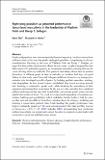Right-wing populism as gendered performance: Janus-faced masculinity in the leadership of Vladimir Putin and Recep T. Erdogan
Author(s)
Eksi, Betul; Wood, Elizabeth A
DownloadAccepted version (375.8Kb)
Open Access Policy
Open Access Policy
Creative Commons Attribution-Noncommercial-Share Alike
Terms of use
Metadata
Show full item recordAbstract
Gender and populism have been extensively theorized separately, but there has not been sufficient study of the way that gender undergirds populism, strengthening its diverse manifestations. Focusing on the cases of Vladimir Putin and Recep T. Erdoğan, we argue that their political performance allows them to project a right-wing populism that hides much of its political program in an ostentatious masculine posturing that has the virtue of being relatively malleable. This political masculinity allows them to position themselves at different points in time as outsiders yet insiders, bad boys yet good fathers. In their early years Putin and Erdogan established themselves as transgressive outsiders who developed a profile of power by building up their masculine, working-class biographies. As their power became consolidated, they turned to a more paternal role, fostering a conservative gender order while attacking the masculinity of their opponents and casting them as outsiders. In this way over the years they have combined political performances that have both breached the conventional gender norms and also upheld and reinforced them. The result is a Janus-faced masculinity of outsiders-yet-insiders, bad-boys-yet-good-fathers, which establishes that the leader is both the same as other men and also different from them, standing above the citizenry, mediating and fostering a conservative political order. Understanding this gender performance also helps to explain the paradox of “electoral authoritarianism” (Levitsky and Way Journal of Democracy, 13(2), 51–65, 2002; Schedler 2006), demonstrating how performed political masculinity can support and connect the cult of a popularly elected leader with conservative social and political gender norms.
Date issued
2019-09Department
Massachusetts Institute of Technology. Department of Humanities. History SectionJournal
Theory and Society
Publisher
Springer Science and Business Media LLC
Citation
Eksi, Betul and Elizabeth A. Wood. "Right-wing populism as gendered performance: Janus-faced masculinity in the leadership of Vladimir Putin and Recep T. Erdogan." Theory and Society 48, 5 (November 2019): 733–751 © 2019 Springer Nature B.V.
Version: Author's final manuscript
ISSN
0304-2421
1573-7853